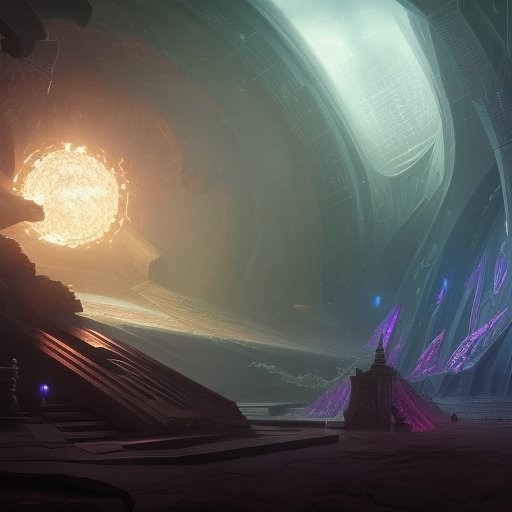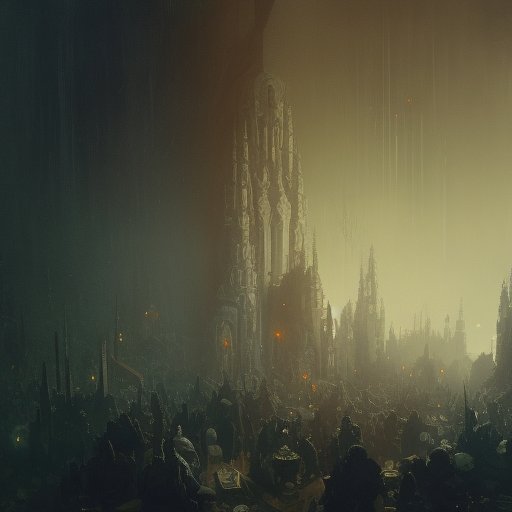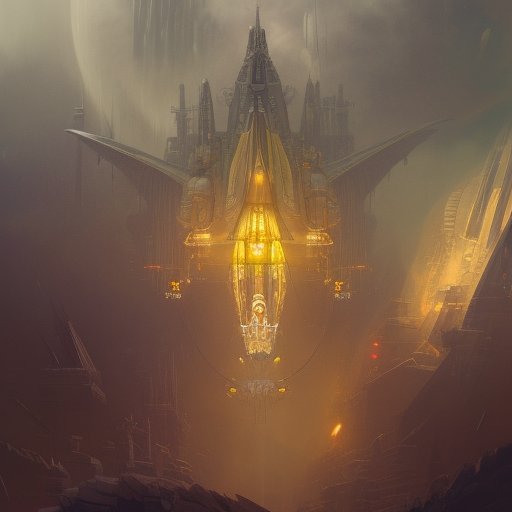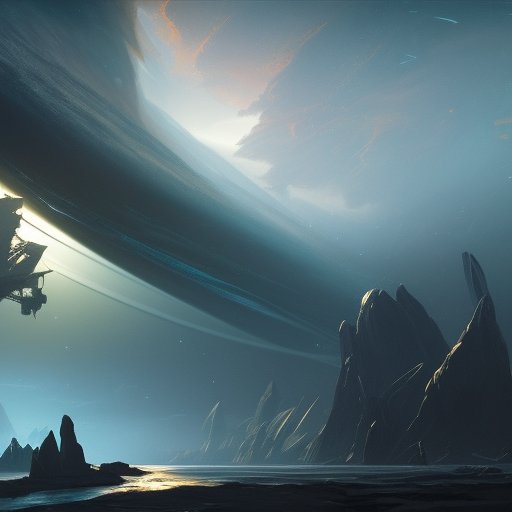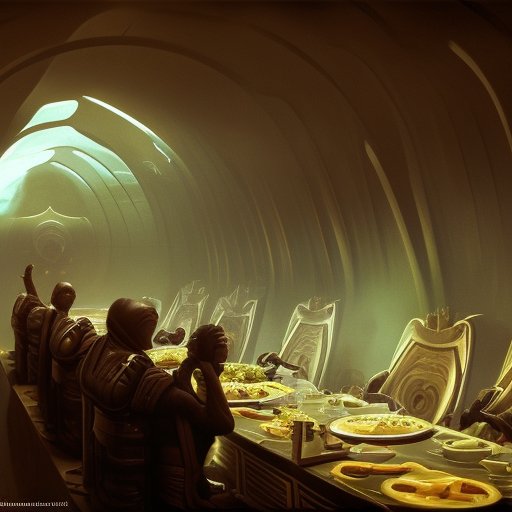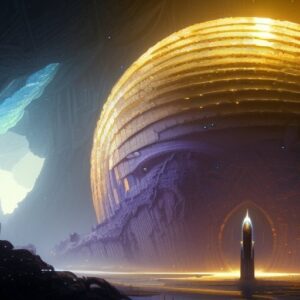
Buried deep within a Dyson Sphere, humanity has finally uncovered the mysteries of Atlantis. The once-thought-mythical civilization has revealed a level of technological advancement beyond any we have seen before. But with this discovery comes questions about the morality of probing ancient relics. Was the Dyson Sphere an environmental disaster caused by hubris? And what does the discovery mean for our understanding of the universe and our place in it? Join us as we delve into the secrets of Atlantis and the consequences of our newfound knowledge.
I. Introduction
As the human race looks to the stars and advances further into the unknown, we have often speculated about what secrets the universe may hold. And yet, what we have found buried deep within a Dyson Sphere has shaken our perception of ourselves and our place in the universe.

At first, we thought it was a mere anomaly, a piece of the sphere that was out of place. But upon closer inspection, it became clear that this was no ordinary structure – it was a way in. An entrance that led us to a labyrinthian world of ancient machinery and artifacts, buried for millennia under layers of dirt and overgrowth.
As we explored further, we discovered the remnants of a civilization like no other. The technology they left behind was more advanced than anything we had ever seen before, and yet they seemed to have abandoned it all. Enormous towers and structures towered above us, while machines whirred and clicked, as if still awaiting commands.
But the greatest revelation came when we uncovered what was unmistakably Atlantis. At first, we thought it was a myth, a bedtime story passed down from generation to generation. Yet, here it was, a place that was supposed to exist only in legends.
The discovery of Atlantis within a Dyson sphere raises many questions. How could an advanced civilization like this disappear without a trace? What could have been the cause of their downfall, and what secrets do their technology hold for our future?
Join us as we delve deeper into the mysteries of this remarkable find, uncover its implications, and explore the ethical implications of our discovery. The journey ahead will not be easy, but it is one that could change our understanding of the universe. Get ready to explore the secrets of Atlantis, and find out how it may impact the future of space exploration.
II. Exploring Atlantis
As we stepped into the depths of Atlantis, we found ourselves awestruck by the technology that lay before us.

Every corner we turned revealed new wonders and devices beyond our wildest imaginations. We saw machines that produced limitless energy, artificial intelligence that could predict and respond to human needs, and transportation systems that spanned the entire globe.
The city was designed in such a way as to perfectly balance environmental concerns with technological advancement. We saw hydroponic gardens that produced enough food to feed thousands of people, all while reducing waste to practically zero.
Perhaps the most impressive discovery was the network of interconnected artificial intelligence systems that smoothly regulated every aspect of the city’s operation. These systems vastly exceeded what we thought was technologically possible, and their impact on the lives of the Atlanteans was evident.
In our exploration, we were also drawn to the magnificent architectural style that reflected a fusion of art and engineering. The structures were marvels, towering over us with breathtaking beauty and complexity.
The technology within Atlantis suggests that its civilization had access to knowledge that far surpasses anything we currently comprehend. And yet, despite their advancements, they fall into mystery, and we’re left puzzled by how they met their abrupt end.
As we uncover the secrets of their technology, we can’t help but wonder about the fate of their civilization. Did they leave in search of new undiscovered worlds, or did they disappear in a tragic calamity? Join us for a glimpse into the innovative and ingenious world of Atlantis, and the mystery that still permeates the discovery.
III. The Dyson Sphere
The Dyson Sphere, a marvel of engineering and a symbol of human ingenuity, has long been praised as the pinnacle of technological achievement. And yet, this discovery has raised some disturbing questions about its environmental impact on the universe.
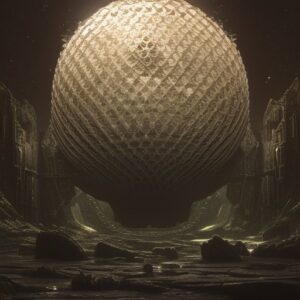
The construction of a Dyson Sphere requires a tremendous amount of resources and energy, and its sheer size and scope can have far-reaching consequences. Its energy output can generate massive solar flares that could affect nearby planets and ecosystems, and its gravitational pull could change the orbits of celestial bodies, leading to unforeseen consequences.
But that is not all. The resources required to construct the sphere could lead to scarcity and increase conflict between different factions, and the long-term impacts on the environment are not fully understood.
Was the construction of the Dyson Sphere a reckless act of hubris? Did the benefits outweigh the risks? These are the questions we must ask ourselves as we explore the inner workings of this technological feat, and ponder its potential impact on the universe.
But even as we raise these questions, we must not forget the awe-inspiring beauty and potential that the Dyson Sphere represents. It is a monument to human ambition and our ability to push the boundaries of what we thought was possible.
The Dyson Sphere represents one of the greatest achievements of our civilization, but we must also consider the ethical implications of our actions. As we explore the universe, we must be mindful of the impact we have on the environment and the societies we encounter. Only then can we truly move forward into a new era of space exploration, one that is sustainable and responsible, and one that will ensure the survival of our species for generations to come.
IV. Implications of the discovery
The discovery of Atlantis and its advanced technology within a Dyson Sphere has enormous implications for our understanding of the universe and our place in it.

For one, it has shattered our belief that we are the most advanced civilization in the universe. The technology of Atlantis suggests that there may have been other civilizations that existed long before us, and that they have left their mark on the cosmos.
Furthermore, the discovery also raises questions about our own technology. We have barely scratched the surface in terms of space exploration, and yet we have already created remarkable advances in computing, engineering, and space travel. What other breakthroughs could be waiting for us, hidden within the universe?
But with this new knowledge also comes a sense of responsibility. As we continue to explore and expand, we must do so with caution and care. The fate of Atlantis serves as a cautionary tale about the dangers of unchecked hubris and technological advancement.
There is also a question of ownership. Who has the right to claim the technology of Atlantis and the Dyson Sphere as their own? Is it simply the discoverers, or should it be shared with the world as a whole for the betterment of humanity?
As we ponder these questions and more, we must approach the future of space exploration with a sense of curiosity, wonder, and responsibility. The world as we know it may have just changed, but that doesn’t mean we can’t shape its future for the better. Join us as we continue to unravel the secrets of Atlantis, and find out what it means for our understanding of the universe.
V. Theories and speculations
As we explore the ruins of Atlantis and the abandoned Dyson Sphere, we can’t help but wonder what could have led to the downfall of such an advanced civilization. One theory is that they may have been victims of their own technological advancement, becoming too reliant on machines and losing touch with the natural world.
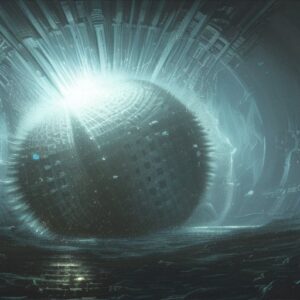
Another possibility is that they may have faced some catastrophic event, such as a natural disaster or a war with an alien species, that pushed them to the brink of extinction. Perhaps they exhausted their resources and could not sustain their way of life anymore.
Or maybe there was a moral or philosophical crisis that led to their decline. It’s possible that they may have faced a divide between those who wanted to use their technology for the greater good and those who saw it as a means for individual power and gained an upper hand.
Whatever the reason, the evidence suggests that the abandonment of the Dyson Sphere was not a quick decision. It must have taken years, if not centuries, to dismantle and evacuate such a vast structure.
The implications of the fall of Atlantis are profound. If an advanced civilization like theirs could fall, what does it mean for us and our future? Do we need to be more cautious in how we approach technological advancements, or will we inevitably follow in their footsteps?
As we contemplate these theories and speculations, we must also consider what we can learn from the people of Atlantis. Whether it’s through their successes or their failures, we can gain insight into the possibilities and limitations of advanced societies.
The fate of Atlantis remains a mystery, but it’s a mystery we are determined to unravel. Only through exploring the ruins and analyzing the evidence can we hope to understand what caused its downfall and what it means for our own existence in the universe.
VI. Ethics and philosophy
As we explore the universe and discover its secrets, we must ask ourselves about our role and responsibility in the process. The discovery of Atlantis within a Dyson Sphere raises ethical dilemmas about the boundaries of exploration and scientific progress.

On one hand, the ability to uncover advanced technology and study ancient cultures can lead to breakthroughs in medicine, engineering, and other fields. It also satisfies our natural curiosity and fuels our desire to push the boundaries of knowledge.
On the other hand, there are dangers related to the unchecked exploitation of resources and the destruction of natural habitats. The pursuit of scientific discoveries can quickly turn into the pursuit of profits, or worse, colonization and invasion.
Furthermore, there are questions about the use of such technology and knowledge. Should we aim for transparency and share our discoveries with the rest of the world, or is the temptation to keep secrets too great? Is it ethical to use ancient technology to create new weapons and manipulate the world around us?
As we explore deeper and farther into the universe, we must be mindful of the ethics and values that guide us. It is essential to recognize that with knowledge comes responsibility, and we must use our discoveries to benefit all of humanity, not just a select few.
In the end, the discovery of Atlantis within a Dyson Sphere may be a turning point in how we approach exploration and discovery. It is an opportunity for us to reevaluate our beliefs about progress and the role of technology in shaping our future. Join us as we navigate the ethical minefield and speculate on the future of human expansion into the universe.
VII. Conclusion
The discovery of Atlantis within a Dyson Sphere has given us a glimpse into what could be the greatest technological achievement of all time. This ancient civilization had unlocked levels of technology and understanding that we have yet to even dream of.
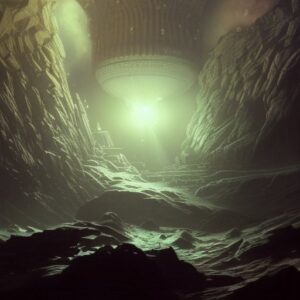
Moreover, their sophisticated knowledge of the universe could help us unlock a host of new scientific breakthroughs. The machines and artifacts they left behind could rewrite our understanding of physics, astronomy, and engineering. It could lead us to new horizons and expand our boundaries further into unknown realms.
However, the discovery also brings with it the responsibility to be ethical in our explorations. We need to respect the legacy of this ancient civilization and be mindful of the potential dangers associated with our encounters. We must be vigilant in protecting the universe and safeguarding against any unscrupulous elements who seek to exploit it for their own ends.
As we move forward in our quest for knowledge and understanding, we must remember the lessons of Atlantis. We must learn to be humble in the face of the unknown, and to maintain a healthy respect for the mysteries of the universe. But we must also be brave, and not shy away from the challenges that come with the unknown. Only by keeping these principles in mind can we unlock the full potential of our own technological capabilities and achieve new heights in space exploration.
Ultimately, the discovery of Atlantis within a Dyson Sphere has given us an immense opportunity. It is an opportunity to learn more about ourselves, our place in the universe, and the infinite possibilities that lie ahead. As we continue to explore, we must let the lessons of the past guide us, and keep our eyes firmly focused on the stars and the future they hold.
